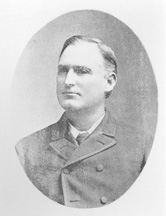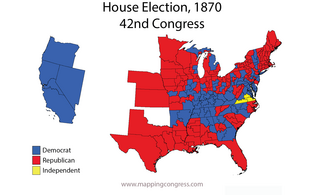The Radical Republicans were a faction within the Republican Party originating from the party's founding in 1854—some six years before the Civil War—until the Compromise of 1877, which effectively ended Reconstruction. They called themselves "Radicals" because of their goal of immediate, complete, and permanent eradication of slavery in the United States. They were opposed during the war by the Moderate Republicans, and by the Democratic Party. Radicals led efforts after the war to establish civil rights for former slaves and fully implement emancipation. After unsuccessful measures in 1866 resulted in violence against former slaves in the rebel states, Radicals pushed the Fourteenth Amendment for statutory protections through Congress. They opposed allowing ex-Confederate officers to retake political power in the Southern U.S., and emphasized equality, civil rights and voting rights for the "freedmen", i.e., former slaves who had been freed during or after the Civil War by the Emancipation Proclamation and the Thirteenth Amendment.

Robert Carlos De Large was a Republican member of the United States House of Representatives from South Carolina, serving 1871 to 1873. He was earlier a delegate to the 1868 state constitutional convention and elected in 1868 to the South Carolina House of Representatives for one term.

Robert Brown Elliott was a British-born American politician of British Afro-Caribbean ethnic background. He was a member of the United States House of Representatives from South Carolina, serving from 1871 to 1874.
New York's 8th congressional district for the U.S. House of Representatives is in the New York City borough of Brooklyn. It is currently represented by Representative Hakeem Jeffries, the House Minority Leader.

John Laurens Manning Irby was a United States senator from South Carolina. Born in Laurens, he attended Laurensville Male Academy (Lauren), Princeton College (Princeton, New Jersey in 1870-1871, and the University of Virginia at Charlottesville from 1871 to 1873. He studied law, was admitted to the bar in 1875, commenced practice at Cheraw, and returned to Laurens. He was appointed lieutenant colonel of the South Carolina Militia in 1877 and that year was also intendant of Lauren. He was a member of the South Carolina House of Representatives from 1886 to 1892, serving as speaker in 1890.
New York's 5th congressional district is a congressional district for the United States House of Representatives, represented by Democrat Gregory Meeks. The district is located in Queens. A plurality of the district's population is African-American, and a majority of the district's population is non-white.
New York's 15th congressional district for the United States House of Representatives is located in New York City, State of New York. The district has been represented by Democrat Ritchie Torres since 2021.

South Carolina's 5th congressional district is a congressional district in northern South Carolina bordering North Carolina. The district includes all of Cherokee, Chester, Fairfield, Kershaw, Lancaster, Lee, Union and York counties and parts of Newberry, Spartanburg and Sumter counties. Outside the rapidly growing cities of Rock Hill, Fort Mill, and Lake Wylie the district is mostly rural and agricultural. The district borders were contracted from some of the easternmost counties in the 2012 redistricting.

Christopher Columbus Bowen was a U.S. Representative from South Carolina.
South Carolina was readmitted to Congress in 1868, after passage of the 14th Amendment. That amendment ended the three-fifths rule effectively raising the population of states that once had slavery. As a result, South Carolina and other slave states tried to seat extra members of Congress. South Carolina choose two additional congress members during an at-large election in 1870. In one of those, Johann Peter Martin Epping defeated Lucius W. Wimbush by 61 votes: 71803-71742. But the House refused to seat him and the other at-large winner. "A number of southern states upon readmission claimed that since their slaves were emancipated, they were entitled to larger delegations in the House. Epping's election falls in this category. The claims were rejected by the House."

The 1870 United States House of Representatives elections in South Carolina were held on November 1, 1870 to select six Representatives for two-year terms from the state of South Carolina. The fifth and sixth seats were decided by an at-large election, but the House of Representatives refused to seat the two winners. The two incumbents who ran were re-elected and the two open seats were retained by the Republicans. The composition of the state delegation thus remained solely Republican.

The 1872 United States House of Representatives elections in South Carolina were held on November 5, 1872 to select five Representatives for two-year terms from the state of South Carolina. The three incumbents who ran were re-elected and the two open seats were retained by the Republicans. The composition of the state delegation thus remained solely Republican.

The 1874 South Carolina United States House of Representatives elections were held on November 3, 1874 to select five Representatives for two-year terms from the state of South Carolina. Two incumbents were re-elected, two open seats were retained by the Republicans, and the open seat in the 2nd congressional district was picked up by the Independent Republicans. The composition of the state delegation after the election was four Republicans and one Independent Republican.

The 1876 United States House of Representatives elections in South Carolina were held on November 7, 1876 to select five Representatives for two-year terms from the state of South Carolina. Two incumbents were re-elected, one was defeated for re-election, and the Democrats picked up one of the two open seats from the Republicans. The composition of the state delegation after the election was three Republicans and two Democrats.

The 1878 United States House of Representatives elections in South Carolina were held on November 5, 1878 to select five Representatives for two-year terms from the state of South Carolina. Two Democratic incumbents were re-elected, two Republican incumbents were defeated and the open seat was picked up by the Democrats. The composition of the state delegation after the election was solely Democratic.

The 1870–71 United States House of Representatives elections were held on various dates in various states between June 6, 1870, and October 6, 1871. Each state set its own date for its elections to the House of Representatives before or after the first session of the 42nd United States Congress convened on March 4, 1871. They occurred in the middle of President Ulysses S. Grant's first term. Elections were held for all 243 seats, representing 37 states.